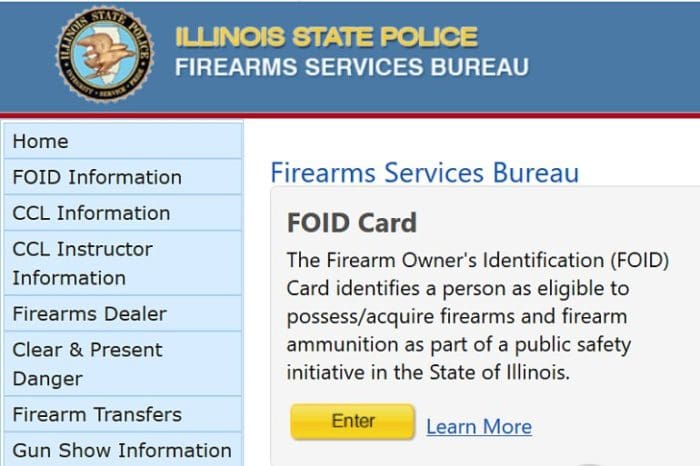In February 2018, a White County, IL Second Judicial Circuit Court judge ruled Illinois Firearms Owners Identification Card Act unconstitutional. Eight months later, after pleadings and motions to reconsider the initial decision, the judge not only reaffirmed his original decision, but supplemented it. Now, IllinoisCarry.com’s spokeswoman Valinda Rowe claims that the Illinois Attorney General will take the case to the Illinois Supreme Court.
Valinda Rowe posted the news at Illinois Carry last week and Ace of Spades picked up the story this weekend buried among the Mueller report coverage.
The case began with the March 2017 arrest of a now-divorced, 4′ 11″ fifty-something woman for the high crime of possessing a single-shot .22 rifle for self-defense. Obviously, she’s not exactly Bonnie Parker of Bonnie and Clyde fame. She failed to have a FOID card for her rifle, despite eligibility to receive one. In February 2018, a White County judge ruled the FOID Act unconstitutional.
10. In this case the facts show the defendant possessed a gun, in her house, for the purpose of self-defense without a FOID card. To require the defendant to fill out a form, provide a picture ID and pay a $10 fee to obtain a FOID card before she can exercise her constitutional right to self-defense with a firearm is a violation of the Second Amendment to the United States Constitution as applied to the States and a violation of Article I, Section 22, of the Constitution of the State of Illinois, as applied to this case only.
11. Based upon the forgoing, the Court finds 430 ILCS 65/2(a)(l) unconstitutional as applied to this case.
Motions and counter-motions poured in, and in October 2018, the judge reaffirmed his ruling and expanded upon it.
3. The Court supplements its ruling of February 2, 2018, as follows:
a. To comply with 430 ILCS 65/2(a)(l) a person must have a FOID card on their person when in either actual or constructive possession of a firearm or ammunition. Owning a FOID card is insufficient to comply with the statute. See People v. Eldens, 63 Ill.App.3d 554 (Fifth Dist. 1978) and People v. Cahill, 37 Ill.App.3d 361 (Second Dist. Second Div. 1976). A person is in constructive possession of a firearm or ammunition when: (1) The person has knowledge of the presence of a weapon or ammunition, and (2) That person is in immediate and exclusive control over the area where the firearm or ammunition is located.
Due to the language of 430 ILCS 65/2(a)(l) and the Court’s interpretation of the statute, it is clear that compliance is impossible when one is in ·their own home. No person could have their FOID card on their person 24 hours each and every day when firearms or ammunition are in the house.
In addition, every person in the home (family member, friend, spouse, etc.) who has knowledge of the firearms or ammunition and has immediate and exclusive control of the area where the firearms or ammunition is located, who does not have a FOID card, would be in violation of the statute.
Thus, 430 ILCS 65/2(a)(l) is unconstitutional, as applied to this defendant, because it is impossible to comply in the person’s .own home. As an alternative, if 430 ILCS 65/2(a)(l) is constitutional then it becomes obvious the legislature did not intend the ~tatute to apply in one’s own home due to impossibility of compliance.
4. The Court reiterates its findings and ruling in its previous Order Finding Statute Unconstitutional filed herein on February 14, 2018, that 430 ILCS 65/2(a)(l) is unconstitutional as applied to the defendant in her own home. The Court further finds and orders that 430 ILCS 65/2(a)(l) is unconstitutional as applied to the defendant in her own home, in violation of the Second Amendment to the United States Constitution, as applied to the States thru the Fourteenth Amendment, and Article I, Section 22 of the Constitution of the State of Illinois, because it is impossible to comply with and that such statute cannot reasonably be construed in a manner that preserve its validity. The Court further finds, in compliance with Supreme Court Rule 18, that ·the finding of unconstitutionality is necessary to the decision arid that such decision cannot rest upon an altemative ground; and that the notice required by Supreme Court Rule 19 has been served and that those served with such notice have been given adequate time and opportunity under the circumstances to defend the statute.
IT IS THEREFORE ORDERED that for the foregoing reasons, and those enumerated in the Order Finding_Statute Unconstitutional filed herein on February 14, 2018, that 430 ILCS 65/2(a)(l) is unconstitutional as applied to the defendant in this case, in violation of the Second Amendment”to the United States Constitution, as applied to the States thru the Fourteenth Amendment, and Article I, Section 22 of the Constitution of the State of Illinois, and by reason thereof, this cause is dismissed with prejudice.
And now, according to Valinda Rowe, the case is headed to the Illinois Supreme Court thanks to Illinois Attorney General Kwame Raoul.
This comes on the heels of the Illinois Supreme Court unanimous ruling that Illinois’ prohibition on TASERS/stun guns is unconstitutional.
As an Illinois resident, I can’t begin to describe how big this case might become. If the Illinois Supreme Court rules the FOID Act unconstitutional, expect Illinois Democrats to proclaim the sky is falling. In reality, given how FOID Act violations so seldom get charged by prosecutors (and even when they do charge, they’re quickly plea-bargained away), a decision to strike down the FOID Act as unconstitutional wouldn’t pose a meaningful obstacle for police and prosecutors.
But a ruling striking down the FOID would rock gun control advocates in the Land of Lincoln.
